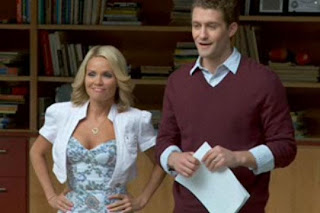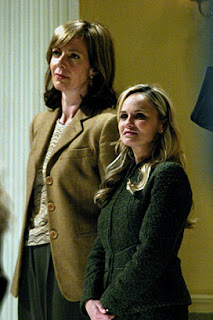 finished it.
finished it.I'll backtrack. Two years ago, I ran across a machine at Costco which converts vinyl recordings to MP3 files, and I began the task of turning my massive collection of records (several hundreds) into digital files. This was during the early months of this blog, and I chronicled the various discoveries I was making as I slogged through my collection, most of which I had not even looked through in 20 or more years. If you are twisted enough to be interested in such things, you can access the entries I wrote during the process here.


 contemporaries like Totie Fields and Phyllis Diller, she was the quickest with the quip.
contemporaries like Totie Fields and Phyllis Diller, she was the quickest with the quip. social satire; the show's cast was uniquely funny, but only one member of the ensemble emerged as a true comic genius: Lily Tomlin. I have two of her early comedy albums, including her first, This Is A Recording. All the routines on this album involve Tomlin's most famous character, Ernestine the Telephone Operator, a character of which Lily herself grew tired (there were several years there, after the Laugh-In period, when she refused to include
social satire; the show's cast was uniquely funny, but only one member of the ensemble emerged as a true comic genius: Lily Tomlin. I have two of her early comedy albums, including her first, This Is A Recording. All the routines on this album involve Tomlin's most famous character, Ernestine the Telephone Operator, a character of which Lily herself grew tired (there were several years there, after the Laugh-In period, when she refused to include  the character in her live performances). Tomlin joined Laugh-In during its second season, and was an immediate hit. During her hiatus from the show, she toured her stand-up routine to various small clubs around the country. I saw her in a tiny cabaret/comedy club in the basement of a strip mall in Atlanta during this period; she was a scream. Her brand of character-based stand-up was pretty new back then, and she specialized in improv with the audience. I knew I was witnessing something very special when she was playing little Edith Ann, the kid with the thpeeth impediment, taking questions from the audience. And her sequence playing Lola the Party Lady at a funeral (she propped up the corpse to use as a ventriloquist's dummy) was wickedly funny.
the character in her live performances). Tomlin joined Laugh-In during its second season, and was an immediate hit. During her hiatus from the show, she toured her stand-up routine to various small clubs around the country. I saw her in a tiny cabaret/comedy club in the basement of a strip mall in Atlanta during this period; she was a scream. Her brand of character-based stand-up was pretty new back then, and she specialized in improv with the audience. I knew I was witnessing something very special when she was playing little Edith Ann, the kid with the thpeeth impediment, taking questions from the audience. And her sequence playing Lola the Party Lady at a funeral (she propped up the corpse to use as a ventriloquist's dummy) was wickedly funny.
I purchased one album by the comedy team of Burns and Schreiber, but only because of the presence on the disc of a woman absolutely nobody has heard of, Ann Elder. She was an occasional performer back in the late 60s; in fact, she was hired to replace Goldie Hawn on Laugh-In. But she was much more successful as a writer, winning Emmys for two of Lily Tomlin's TV specials. This particular album is called The Watergate Comedy Hour, and was
 released during the Senate's investigation into the scandal which brought down the Nixon presidency. Elder wrote much of the album, and appears on it as Nixon's embattled secretary, Rosemary ("I erased 18 minutes") Woods. Along with Burns and Schreiber, the ensemble included Fannie Flagg (Fried Green Tomatoes), who's a hoot as loudmouthed whistle-blower Martha Mitchell, and Jack Riley, who later found fame on Bob Newhart's first sitcom.
released during the Senate's investigation into the scandal which brought down the Nixon presidency. Elder wrote much of the album, and appears on it as Nixon's embattled secretary, Rosemary ("I erased 18 minutes") Woods. Along with Burns and Schreiber, the ensemble included Fannie Flagg (Fried Green Tomatoes), who's a hoot as loudmouthed whistle-blower Martha Mitchell, and Jack Riley, who later found fame on Bob Newhart's first sitcom.
Another funny lady represented in my collection is Bette Midler. The Divine Miss M released a stand-up comedy album in 1985, recorded live at the Improv in LA. I don't know why this musical diva wanted the experience of stand-up, and truth be told, her jokes are better when they are surrounded by musical interludes. Mud Will Be Flung Tonight includes some very raunchy Sophie Tucker jokes, and has only two songs, one of which, "Otto Titzling," was successful enough to be included in later film and talk show appearances.

The cover of Flip Wilson's album, The Devil Made Me Buy This Dress, leads one to believe the entire recording will be centered on his famous drag persona, Geraldine, but in fact, his female alter-ego appears in only a couple of routines on the album. Wilson had a break-out variety show in the early 70s, a series which landed in the number 2 slot in the Nielson ratings its first two years. He broke with convention and had no chorus, and his performance space was in the round,
 resembling an intimate nightclub. His style was hip and up-to-date, and was very accessible to a wide demographic. Flip's salary demands escalated just as he was facing stiff competition from The Waltons, and the show was cancelled after its fourth season. Wilson's "Geraldine" skits were always stand-outs on his show; ditto this album.
resembling an intimate nightclub. His style was hip and up-to-date, and was very accessible to a wide demographic. Flip's salary demands escalated just as he was facing stiff competition from The Waltons, and the show was cancelled after its fourth season. Wilson's "Geraldine" skits were always stand-outs on his show; ditto this album. The last comedy album I converted to MP3 was recorded by another legendary funny lady, Paul Lynde. It's a disappointing effort; Lynde is much funnier on the various Hollywood Squares albums. Recently Released was recorded while he appeared in his breakthrough role of Harry McAfee in Broadway's Bye Bye Birdie, and he is clearly not a star at stand-up. But I've always been his fan, and this album is a rarity.
The last comedy album I converted to MP3 was recorded by another legendary funny lady, Paul Lynde. It's a disappointing effort; Lynde is much funnier on the various Hollywood Squares albums. Recently Released was recorded while he appeared in his breakthrough role of Harry McAfee in Broadway's Bye Bye Birdie, and he is clearly not a star at stand-up. But I've always been his fan, and this album is a rarity.  rescue organization. I'm told they have various experts who examine their incoming merchandise and assign realistic prices; I bet most of my collection would go for two bucks apiece or so. But there are a few actual gems hidden among the mountains of vinyl, which I hope might bring a nice price.
rescue organization. I'm told they have various experts who examine their incoming merchandise and assign realistic prices; I bet most of my collection would go for two bucks apiece or so. But there are a few actual gems hidden among the mountains of vinyl, which I hope might bring a nice price.













































































,+Olney+Theatre+Center,+2004.jpg)



,+Shakespeare+Theatre+Company,.jpg)


,+Warehouse+Theatre,+1999.jpg)
,+Are.jpg)
,+Everyman+Theatre,2002.jpg)
,+First+Nationa.jpg)
,+Shakespeare+Theatre+Company,.jpg)






,+Granada+Th.jpg)
,+Globe+Playhouse,.jpg)
,+CSUN,+1976.jpg)


